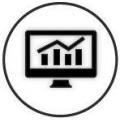This two-part series will focus on how to set up database-like structures, navigate them, create models and build various types of reports in Microsoft Excel. By the end of this series, participants will be able to sort and look for information within large datasets, use character-based functions, pivot tables, and build basic financial models.
Sign up for our weekly newsletter!
This is an archive of our past training offerings. We are looking to include workshops on topics not yet covered here. Is there something not currently on the list? Send us a proposal.
This hands on workshop builds on part 2 by introducing the basics of Python's scikit-learn package to implement unsupervised text analysis methods. This workshop will cover a) vectorization and Document Term Matrices, b) weighting (tf-idf), and c) uncovering patterns using topic modeling.
Git is a powerful tool for keeping track of changes you make to the files in a project. You can use it to synchronize your work across computers, collaborate with others, and even deploy applications to the cloud. In this workshop, we'll learn the basics of understanding and using Git, including working with the popular "social coding" website, GitHub.
This workshop will introduce students to the basics of designing a survey instrument using the Qualtrics platform, such as randomization and survey flow. We will also cover more advanced topics like implementing embedded data and using javascript, as well as tips and tricks on how to use your design to maximize the number of quality responses you get.
This hands on workshop goes through the common “preprocessing recipe” that is used as the foundation for a variety of other applications as well as some basic natural language processing techniques. These include: a) digitization (utf 8), b) removal of stopwords, numbers, punctuation, c) tokenization, d) calculation of word frequencies / proportions, e) part of speech tagging, and f) concordan
This two-part workshop provides an introduction to both quantitative and qualitative social science methods.
In this workshop, we will begin with a dataset scraped from Twitter, which came from the hashtag March4Trump during the rally in Berkeley. Next we will structure our data in Jupyter Notebooks in order to visualize it using social network analysis in Gephi. We will finish by running statistical analysis and discussing implications and questions.
This non-technical workshop provides an overview of computational text analysis methods and tools. No experience in this area is expected or required. The goal is to provide an orientation for those wishing to go further with text analysis and interpret results of these methods.
This four-part, interactive workshop series is your complete introduction to programming Python for people with little or no previous programming experience. By the end of the series, you will be able to apply your knowledge of basic principles of programming and data manipulation to a real-world social science application.
Data are the foundations of the social and biological sciences. Familiarizing yourself with a programming language can help you better understand the roles that data play in your field. Learn to develop and train your data skills at the free D-Lab R workshops!
This three-part series will cover the following materials:
Part 1: Introduction (Tuesday, May 2)
This four-part, interactive workshop series is your complete introduction to programming Python for people with little or no previous programming experience. By the end of the series, you will be able to apply your knowledge of basic principles of programming and data manipulation to a real-world social science application.
Part 3 Topics:
Data are the foundations of the social and biological sciences. Familiarizing yourself with a programming language can help you better understand the roles that data play in your field. Learn to develop and train your data skills at the free D-Lab R workshops!
This three-part series will cover the following materials:
Part 1: Introduction (Tuesday, May 2)
Coding is done, now what? You’ve finished coding your qualitative data and now it’s time to start the “analysis” process. Where do you start? Through this interactive workshop session, qualitative researchers will learn several approaches to transition from coding to analysis. Researchers in all phases of the qualitative research process are welcome to attend.
This four-part, interactive workshop series is your complete introduction to programming Python for people with little or no previous programming experience. By the end of the series, you will be able to apply your knowledge of basic principles of programming and data manipulation to a real-world social science application.
Part 2 Topics:
Data are the foundations of the social and biological sciences. Familiarizing yourself with a programming language can help you better understand the roles that data play in your field. Learn to develop and train your data skills at the free D-Lab R workshops!
This workshop covers how to organize and analyze qualitative data in MaxQDA. The training will outline the key decisions researchers must make about approaching coding and what data is most relevant, as well as review how to set up a database, and use folders, codes, document variables, and queries in MaxQDA.
This four-part, interactive workshop series is your complete introduction to programming Python for people with little or no previous programming experience. By the end of the series, you will be able to apply your knowledge of basic principles of programming and data manipulation to a real-world social science application.
Part 1 Topics:
This three-part series will cover the following materials:
Part 1: Introduction (Tuesday, May 2)






